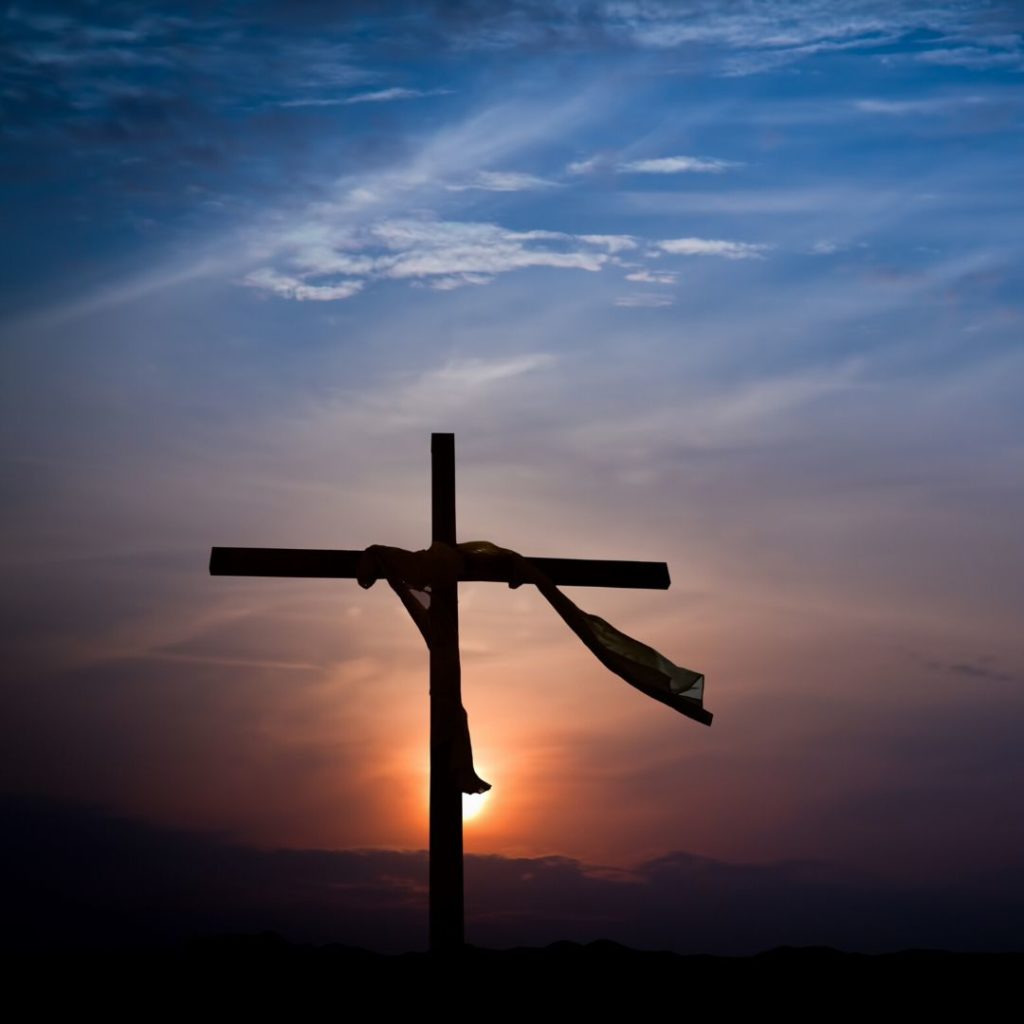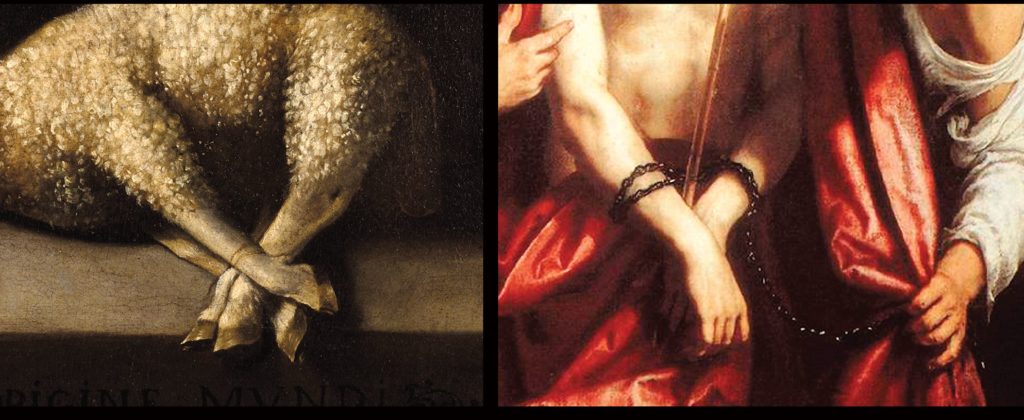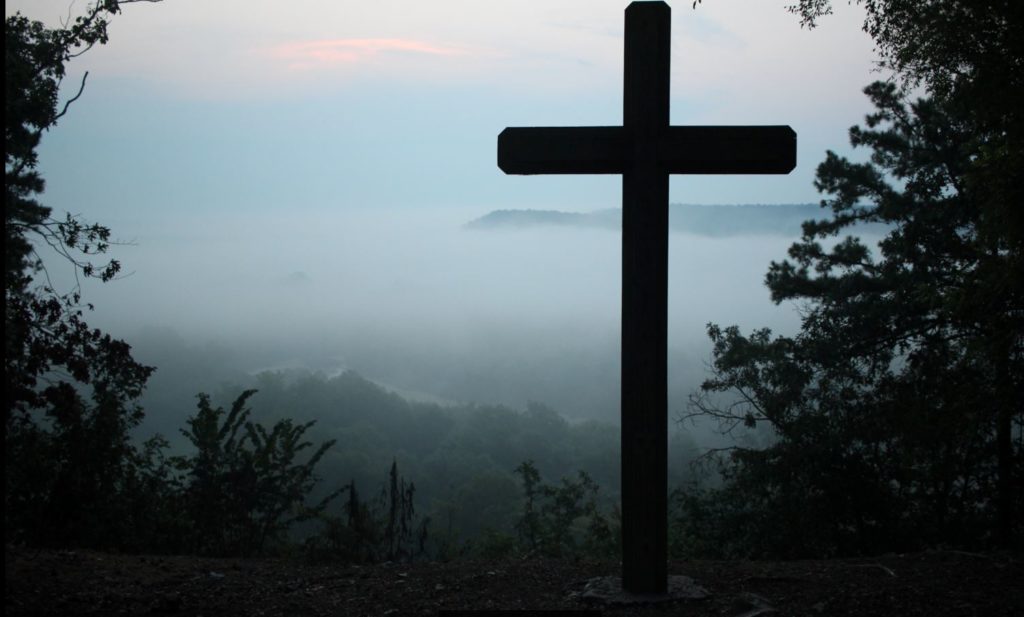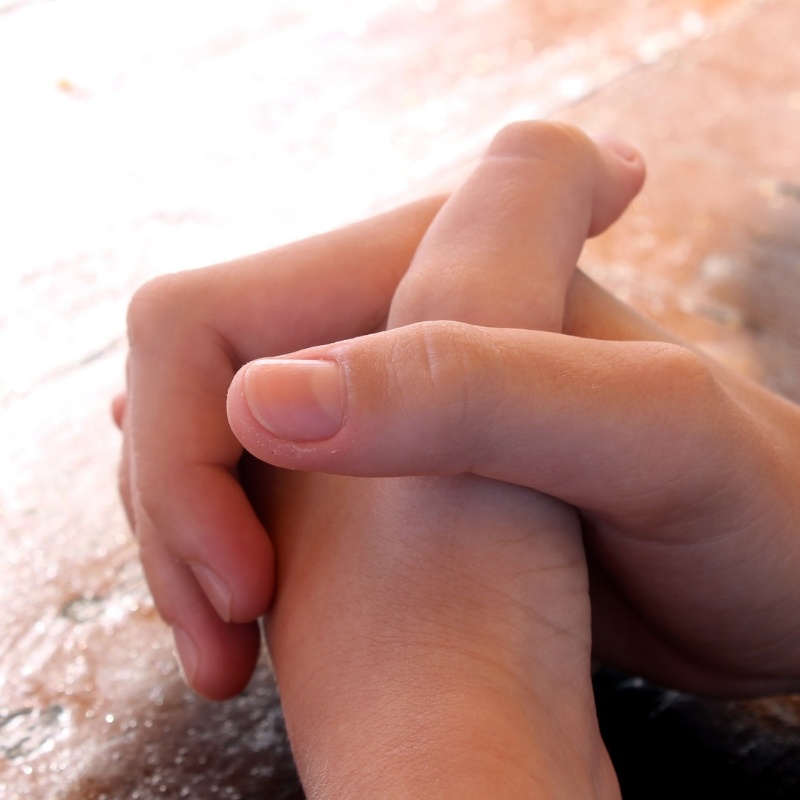“Carrying the cross by himself, he went to the place called Place of the Skull (in Hebrew, Golgotha). There they nailed him to the cross. Two others were crucified with him, one on either side, with Jesus between them. And Pilate posted a sign on the cross that read, ‘Jesus of Nazareth, the King of the Jews.’ The place where Jesus was crucified was near the city, and the sign was written in Hebrew, Latin, and Greek, so that many people could read it.
Then the leading priests objected and said to Pilate, ‘Change it from ‘The King of the Jews’ to ‘He said, I am King of the Jews.’
Pilate replied, ‘No, what I have written, I have written.’

When the soldiers had crucified Jesus, they divided his clothes among the four of them. They also took his robe, but it was seamless, woven in one piece from top to bottom. So they said, ‘Rather than tearing it apart, let’s throw dice for it.’ This fulfilled the Scripture that says, ‘They divided my garments among themselves and threw dice for my clothing.’ So that is what they did.
Standing near the cross were Jesus’ mother, and his mother’s sister, Mary (the wife of Clopas), and Mary Magdalene. When Jesus saw his mother standing there beside the disciple he loved, he said to her, ‘Dear woman, here is your son.’ And he said to this disciple, ‘Here is your mother.’ And from then on this disciple took her into his home.
Jesus knew that his mission was now finished, and to fulfill Scripture he said, “I am thirsty.” A jar of sour wine was sitting there, so they soaked a sponge in it, put it on a hyssop branch, and held it up to his lips. When Jesus had tasted it, he said, “It is finished!” Then he bowed his head and gave up his spirit.

It was the day of preparation, and the Jewish leaders didn’t want the bodies hanging there the next day, which was the Sabbath (and a very special Sabbath, because it was Passover week). So they asked Pilate to hasten their deaths by ordering that their legs be broken. Then their bodies could be taken down. So the soldiers came and broke the legs of the two men crucified with Jesus. But when they came to Jesus, they saw that he was already dead, so they didn’t break his legs. One of the soldiers, however, pierced his side with a spear, and immediately blood and water flowed out. (This report is from an eyewitness giving an accurate account. He speaks the truth so that you also may continue to believe) These things happened in fulfillment of the Scriptures that say, ‘Not one of his bones will be broken,’ and ‘They will look on the one they pierced.’ John 19:17-37, NLT
Notes from the Life Application Study Bible
This place called Golgotha, “the Skull,” was probably a hill outside Jerusalem along a main road. Tradition says that the rock formation of the hill looked like a skull. Many were executed in this place so the Romans could use them as an example to the people who traveled along the road. Crucifixion was a Roman form of execution. Those who were condemned would be forced to carry their crosses along a main road to their execution site as a warning to the people. Types of crosses and methods of crucifixion varied. Jesus was nailed to his cross; some people were tied to theirs with ropes. Either way, death came by suffocation because the weight of the victim’s body made breathing difficult as they lost strength. Crucifixion brought a hideously slow and painful death.

“And Pilate posted a sign on the cross that read, ‘Jesus of Nazareth, the King of the Jews.'” This sign was meant to be ironic. A king stripped nearly naked and executed in public view had obviously lost his kingdom forever. But Jesus, who turns the world’s wisdom upside down, was just coming into his Kingdom. His death and resurrection would strike the death blow to Satan’s rule and would establish Jesus’ eternal authority over the earth. Few people reading the sign that bleak afternoon understood its real meaning, but the sign was absolutely true. All was not lost. Jesus was King of the Jews—as well as the Gentiles and the whole universe. The sign was written in three languages: Hebrew for the native Jews, Latin for the Roman occupation forces, and Greek for foreigners and Jews visiting from other lands. Ironically, this sign, by virtue of being written in multiple languages, declared that Jesus was Lord of all.
Roman soldiers in charge of crucifixions customarily took for themselves the clothes of the condemned men. They divided Jesus’ clothing and threw dice to determine who would get his seamless garment, his most valuable piece of clothing. This fulfilled the prophecy in Psalm 22:18.

Even while dying on the cross, Jesus was concerned about his family. He instructed John to care for Mary, Jesus’ mother. Our families are precious gifts from God, and we should value and care for them under all circumstances. Neither Christian work nor key responsibilities in any job or position excuse us from caring for our families. What can you do today to show your love to your family? Jesus asked his close friend John, the writer of this Gospel, to care for Jesus’ mother, Mary, whose husband, Joseph, must have been dead by this time. Why didn’t Jesus assign this task to his brothers? As the oldest son, Jesus entrusted his mother to a person who stayed with him at the cross—and that was John. Tradition says that Mary moved to Ephesus later with John and that both are buried there.
This sour wine was a cheap form of wine normally mixed with water that the Roman soldiers drank to quench their thirst while waiting for those crucified to die. Until this time, a complicated system of sacrifices had atoned for sins. Sin separates people from God, and only through the sacrifice and shed blood of an animal, a substitute, could people be forgiven and become clean before God. But people sin continually, so frequent sacrifices were required. Jesus, however, became the final and ultimate sacrifice for sin. The word translated “finished” also means “paid in full.” Jesus came to finish God’s work of salvation (4:34; 17:4), to pay the full penalty for our sins. With his death, the complex sacrificial system ended because Jesus took all sin upon himself. Now we can freely approach God because of what Jesus did for us. Those who believe in Jesus’ death and resurrection can live eternally with God and escape the penalty that comes from sin.

These Romans were experienced soldiers. They knew from many previous crucifixions how to tell whether a man was dead or alive. There was no question that Jesus was dead when they checked him, so they decided not to break his legs as they had done to the other victims. Piercing his side and seeing the sudden flow of blood and water (indicating that the sac surrounding the heart and the heart itself had been pierced) was further proof of his death. Some people say that Jesus didn’t really die, that he only passed out—and that’s how he appeared to come back to life. But we have the witness of an impartial party, the Roman soldiers, that Jesus died on that cross (see Mark 15:44-45).
It was against God’s law to leave the body of a dead person exposed overnight (Deuteronomy 21:23), and it was also against the law to work after sundown on Friday, when the Sabbath began. This is why the religious leaders urgently wanted to get Jesus’ body off the cross and buried by sundown.

The Roman soldiers would break victims’ legs to hasten the death process. When a person hung on a cross, death would come by suffocation, but the victim could push against the cross with their legs to hold up their body and keep breathing. With broken legs, they would suffocate almost immediately. The graphic details of Jesus’ death are especially important in John’s record because he was an eyewitness. They certified his accounts as authentic.
Jesus died as the lambs for the Passover meal were being slain. Not a bone was to be broken in these sacrificial lambs (Exodus 12:46; Numbers 9:12). Jesus, the Lamb of God, was the perfect sacrifice for the sins of the world (1 Corinthians 5:7).
Take a look inside the Life Application Study Bible, Third Edition




















Recent Comments